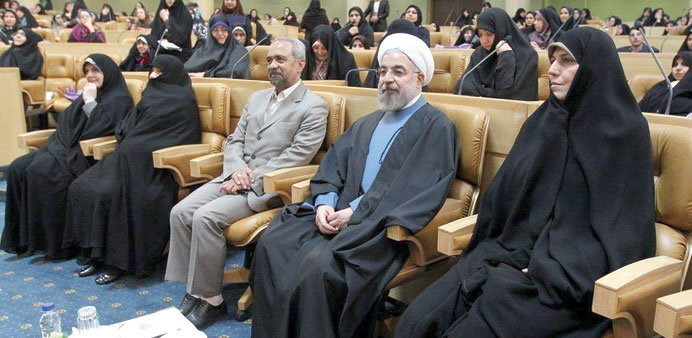AFP
|
|
Iran’s President Hassan Rohani admitted yesterday that women in his country still face discrimination and cultural barriers but he insisted they are not universally treated as second-class citizens.
In a speech marking Women’s Day in Iran, Rohani, seen as a moderate reformer, said more had to be done but that the West did not offer a model that had to be followed.
The remarks were followed by confirmation that the country’s supreme leader, Ayatollah Ali Khamenei, had agreed to pardon or commute the sentences of some women prisoners.
Rohani’s speech was consistent with his promise of more social freedoms, a cornerstone of the campaign that gave him a surprise victory in the June presidential election.
“I, as the head of the government, confess there are still so many deficiencies with regards to the vindication of women’s rights,” Rohani told a conference attended by members of Iran’s female elite.
“Based on the Islamic criteria, we neither consider men as the first sex nor the women as the second sex ... they both have the same human dignity and none is superior,” he said, drawing warm applause.
Iran’s civil rights record is regularly criticised by international rights watchdogs and Western governments.
Among the criticisms levelled at the Islamic Republic is a ban on women travelling abroad without official permission. Within the country, many hotels will not allow a woman to check into a room if she is alone.
Rohani has the backing of reformists, moderates and some conservatives.
Arguing that it was misguided to think a woman’s place should be limited to the home, he questioned why “some people think the presence of women is a threat”, noting that women are guardians of their own moral standards, not men.
“Is that possible to corner and marginalise the role of half of the society? Women should enjoy equal opportunities, security and social rights,” he said.
“We will not accept the culture of sexual discrimination.”
A message on the supreme leader’s website said he had agreed to pardon or commute the sentences of a group of convicted women, following a request from the country’s judiciary chief.
The crimes of those shown clemency on Women’s Day were not of a serious nature, it said.

